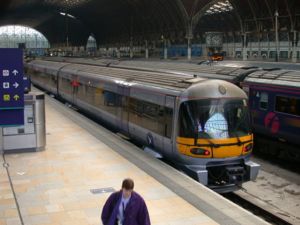Heathrow Express

| |
|---|---|

| |
| Franchise(s): | Not subject to franchising; service began 23 June 1998 |
| Main route(s): | London Paddington – Heathrow Airport |
| Other route(s): | None |
| Fleet size: | 14 Class 332 sets |
| Stations: | 3 (2 operated) |
| Parent company: | BAA plc |
| Web site: | www.heathrowexpress.com |
Heathrow Express is a train service from Heathrow Airport to Paddington in central London operated by the Heathrow Express Operating Authority—a wholly owned subsidiary of BAA. The service is not part of the National Rail system, despite part of its journey sharing track with National Rail trains and terminating at a London mainline station.
Contents
Service
It operates from approximately 0500 until 0000, with trains every 15 minutes. At Paddington, it uses two dedicated platforms (6 and 7). There are two stops at Heathrow: Heathrow Central (journey time from Paddington approximately 15 minutes), and Heathrow Terminal 4 (journey time approximately 22 minutes). Once the new Terminal 5 opens, Heathrow Express services will no longer call at Terminal 4, which will become the new terminus for Heathrow Connect.
The service uses Class 332 electric multiple unit trains built by Siemens. The trains incorporate numerous modern features including video monitors and the ability to use mobile phones throughout the journey—even when in tunnels. The monitors are mostly used for advertising purposes and for the broadcast of news and weather updates produced for Heathrow Express by BBC World.
Since its opening, Heathrow Express has been generally well received, not least because steps were taken to reduce the environmental impact of the train line. Measures included disguising ventilation shafts as barns. The service has received some criticism, however, mainly due to its cost, the lack of quiet zone on some trains and the poor air quality at Paddington station.
As of 2007, it costs around £15 for a single journey in standard class and around £24 for first class. Comparable airport trains in the UK and the rest of Europe charge a small fraction of the Heathrow Express fare; the train from Birmingham to Birmingham International Airport costs £2.60, while the London Underground's Piccadilly Line service from Central London to Heathrow Airport costs £4 (cash price) or £3.50 (Oyster), and the Gatwick Express service to Gatwick Airport is the same fare for a longer mileage journey. The Stansted Express service to Stansted Airport is also the same fare, yet is 23 miles farther from London than Heathrow.
The alternative Heathrow Connect can get from London to Heathrow for less but the service is 10 minutes longer. For some passengers this is a better option, particularly as it offers a connection to the Central Line at Ealing Broadway on returning to London.
Airport commuters can get a discount through the Airport Commuter scheme operated by BAA. A monthly pass costs £130 as of January 2007.
Construction
Construction began in 1993. The principal works were the construction of a 5 mile tunnel and underground stations at Heathrow, and electrification of the Great Western Main Line between Paddington and Airport Junction. A flying junction known as Stockley Flyover was constructed to connect the tunnel to the GWML fast lines.
One of the most catastrophic civil engineering disasters in British history occurred on 21st October, 1994, when one of the partially constructed tunnels carrying the railway into the Terminal 1,2,3 complex collapsed without warning. An office building and a car park were consumed by the huge crater which opened up between Heathrow's two parallel runways. The principal contractor, Balfour Beatty, was found guilty of negligence in February 1999. The collapse had far reaching consequences, since it also stopped construction of the extended Jubilee Line of the London Underground, where contractors were using similar tunnelling methods.
Beginning in January 1998, an interim service called Heathrow FastTrain ran to a temporary station called Heathrow Junction", where a coach took passengers the rest of the way. The full service opened on 23 June 1998.
Route
| London Paddington | |
| Heathrow Terminals 1, 2 and 3 | |
| Heathrow Terminal 4 |
The serivce runs along the Great Western Main Line from Paddington to airport junction (Network Rail owned infastructure). The line from airport junction to the airport terminals is owned by BAA. The line is electrified at 25 kV AC overhead and uses Automatic Train Protection.
Rolling Stock
Current fleet
| Class | Image | Type | Top speed | Number | Routes operated | Built | |
|---|---|---|---|---|---|---|---|
| mph | km/h | ||||||
| Class 332 | 
|
electric multiple unit | 100 | 160 | 14 | London Paddington - Heathrow Airport | 1998 |
External links
See also
| Domestic: | Arriva Trains Wales - c2c - Central Trains - Chiltern Railways - First Capital Connect First Great Western - First ScotRail - Grand Central1 - GNER - Heathrow Connect Hull Trains - Island Line2 - Merseyrail - Midland Mainline - Northern Rail Northern Ireland Railways3 - 'one' - Silverlink - Southeastern - Southern South West Trains - TransPennine Express - Virgin Trains |
|---|---|
| International: | Enterprise3 - Eurostar |
| Airport Link: | Gatwick Express - Heathrow Express - Stansted Express4 |
| Sleeper: | Caledonian Sleeper5 - Night Riviera6 |
| 1 Starts 20 May 2007 - 2 Operated by South West Trains - 3 Operated on the Irish railway network 4 Operated by 'one' - 5 Operated by First ScotRail - 6 Operated by First Great Western | |
| Future passenger train operators in Great Britain | |
|---|---|
| New Franchises: | Cross Country1 - East Midlands1 - InterCity East Coast - London Overground1 West Midlands1 |
| Proposed open-access operators: |
Grand Union2 - Wrexham & Shropshire3 |
| 1 Starts November 2007 - 2 Proposed - 3 Awaiting Approval | |
cs:Heathrow Express de:Heathrow Express fr:Heathrow Express it:Heathrow Express nl:Heathrow Express
